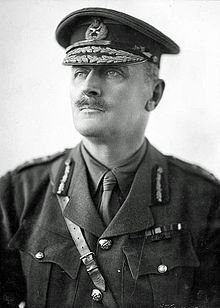
Back إدموند ألنبي Arabic ادموند النبى ARZ Edmund Allenbi Azerbaijani Эдмунд Аленбі Byelorussian Едмънд Алънби Bulgarian Edmund Allenby Catalan Edmund Allenby Czech Edmund Allenby, Is-iarll 1af Allenby Welsh Edmund Allenby, 1. Viscount Allenby German Edmund Allenby Esperanto
The Viscount Allenby | |
|---|---|
 Field Marshal Viscount Allenby | |
| High Commissioner in Egypt | |
| In office 1919–1925 | |
| Monarch | George V |
| Preceded by | Reginald Wingate |
| Succeeded by | George Lloyd |
| Personal details | |
| Born | 23 April 1861 Brackenhurst, Nottinghamshire, UK |
| Died | 14 May 1936 (aged 75) London, UK |
| Spouse(s) | Adelaide Mabel Chapman, Viscountess Allenby of Megiddo |
| Nickname | The Bloody Bull or The Bull |
| Military service | |
| Allegiance | United Kingdom |
| Branch/service | British Army |
| Years of service | 1880–1925 |
| Rank | Field Marshal |
| Commands | Egyptian Expeditionary Force British Third Army V Corps Cavalry Corps 1st Cavalry Division 4th Cavalry Brigade 5th Royal Irish Lancers 6th (Inniskilling) Dragoons |
| Battles/wars | |
| Awards | Knight Grand Cross of the Order of the Bath Knight Grand Cross of the Order of St Michael and St George Knight Grand Cross of the Royal Victorian Order Full list |
Field Marshal Edmund Henry Hynman Allenby, 1st Viscount Allenby, GCB, GCMG, GCVO, KStJ (23 April 1861 – 14 May 1936) was a senior British Army officer and Imperial Governor. He fought in the Second Boer War and also in the First World War, in which he led the British Empire's Egyptian Expeditionary Force (EEF) during the Sinai and Palestine Campaign against the Ottoman Empire in the conquest of Palestine.
The British succeeded in capturing Beersheba, Jaffa, and Jerusalem from October to December 1917. His forces occupied the Jordan Valley during the summer of 1918, then went on to capture northern Palestine and defeat the Ottoman Yildirim Army Group's Eighth Army at the Battle of Megiddo, forcing the Fourth and Seventh Army to retreat towards Damascus. Subsequently, the EEF Pursuit by Desert Mounted Corps captured Damascus and advanced into northern Syria.
During this pursuit, he commanded T. E. Lawrence ("Lawrence of Arabia"), whose campaign with Faisal's Arab Sherifial Forces assisted the EEF's capture of Ottoman Empire territory and fought the Battle of Aleppo, five days before the Armistice of Mudros ended the campaign on 30 October 1918. He continued to serve in the region as High Commissioner in Egypt from 1919 until 1925, a position that meant he effectively ruled Egypt during this period.[1]
- ^ A. D. Roberts, The Cambridge History of Africa, 1986, ISBN 0521225051, 7:742
© MMXXIII Rich X Search. We shall prevail. All rights reserved. Rich X Search